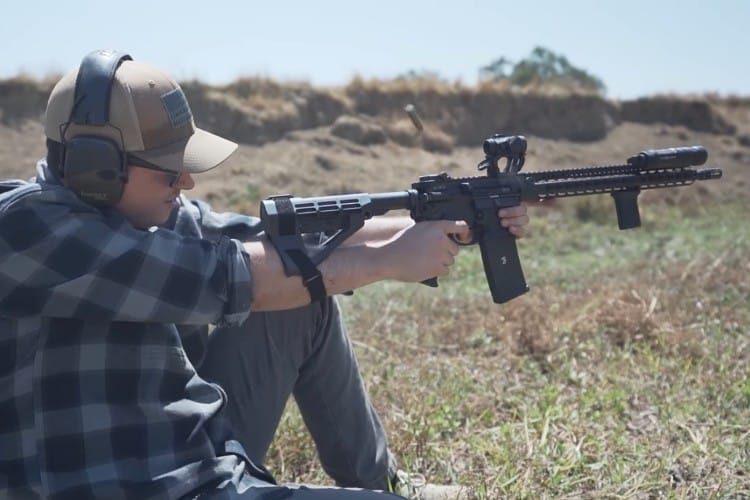
Court rulings against the ATF (the Bureau of Alcohol, Tobacco, Firearms and Explosives) for being “arbitrary and capricious” in its continued war against law-abiding gun owners continue to pile up.
Last Friday, the 8th Circuit Court of Appeals reversed a lower court’s ruling against 25 states in Firearms Regulatory Accountability Coalition, Inc. v. Garland. The court declared that the ATF’s “Final Rule” turning pistols with braces into short-barreled rifles was “arbitrary and capricious,” and required the lower court to revise its ruling accordingly.
This is the second victory for the National Rifle Association (NRA). In NRA v. ATF, the District Court for the Northern District of Texas prevented the rule from being enforced against NRA members.
ATF’s Pistol-brace “Final Rule”
For decades the ATF had held that pistol braces — accoutrements designed to assist disabled citizens in enjoying their shooting freedoms — did not turn pistols fitted with them into “machine guns” that would fall under the onerous (and unconstitutional) National Firearms Act of 1934.
But the Biden administration determined to diminish and eventually extinguish the God-given right to self-defense guaranteed under the Second Amendment. In January 2023, using the murder of 10 people at a grocery store in Boulder, Colorado, as cover, the administration ordered the ATF to declare that firearms fitted with braces (as was the firearm used by the shooter in Boulder) must be considered short-barreled rifles, and therefore be registered and regulated under the 1934 law.
Multiple Lawsuits
The proposed change in definition “proved controversial and comments were overwhelmingly negative,” wrote the appeals court in its decision. Nevertheless, the ATF proceeded. At least nine lawsuits were filed in protest, calling out the agency’s overreach of its authority.
In fact, so many lawsuits were filed that the NRA persuaded U.S. District Court Judge Sam Lindsay (appointed to his position by then-President Bill Clinton!) to prevent the ATF from prosecuting citizens under the expanded definition until all lawsuits were heard and settled. As The New American noted at the time:
The agency ignored its own history, the Constitution, the Administrative Procedure Act, the Second Amendment, the quarter of a million Americans who protested against it during the “public comment” period, and the letter from the Senate Republican Caucus declaring that its enforcement “would turn millions of [otherwise] law-abiding Americans into criminals overnight, and would constitute the largest Executive branch-imposed gun registration and confiscation scheme in American history.”
The ATF remained tone-deaf, though, and proceeded anyway. The NRA contended that “by a stroke of a pen [the agency] redefines ‘pistols’ with stabilizing braces as short-barreled ‘rifles’ subject to the onerous licensing and taxation requirements of the National Firearms Act of 1934.”
The crux of the issue is the willful violation of the separation of powers deliberately and intentionally built into the U.S. Constitution by the Founders, who knew the nature of man and the desire of politicians and tyrants to expand their powers over their subjects unless restrained.
“Arbitrary and Capricious”
In Mock v. Garland, decided in June, U.S. District Court Judge Reed O’Connor ruled against the ATF in another pistol-brace lawsuit. He ruled that it violated the agency’s own internal procedures, and that such violation was arbitrary and capricious.
So it is with the decision announce last Friday:
The district court denied the Coalition’s [the plaintiffs’] motion for a preliminary injunction. The Coalition appeals that denial.
We conclude the Coalition is likely to succeed on the merits of its arbitrary-and-capricious challenge, so we reverse [the lower court’s ruling] and [send the complaint back] to the district court.
The 8th Circuit drew from one of the many successful lawsuits against the ATF to bolster its decision. In Garland v. Cargill, for example, a plaintiff sued the ATF’s reinterpretation that turned a pistol into a “machine gun” to include weapons fitted with bump stocks. In that case, the court ruled that the ATF had exceeded its statutory authority.
The 8th Circuit on Friday declared:
[The ATF’s] “Final Rule, as a whole, is arbitrary and capricious because it allows the ATF to arrive at whatever conclusion it wishes.” …
[Therefore,] “We reverse the order [from the lower court] denying a preliminary injunction and remand with instructions to reconsider the motion consistent with this opinion.”
Related articles:




